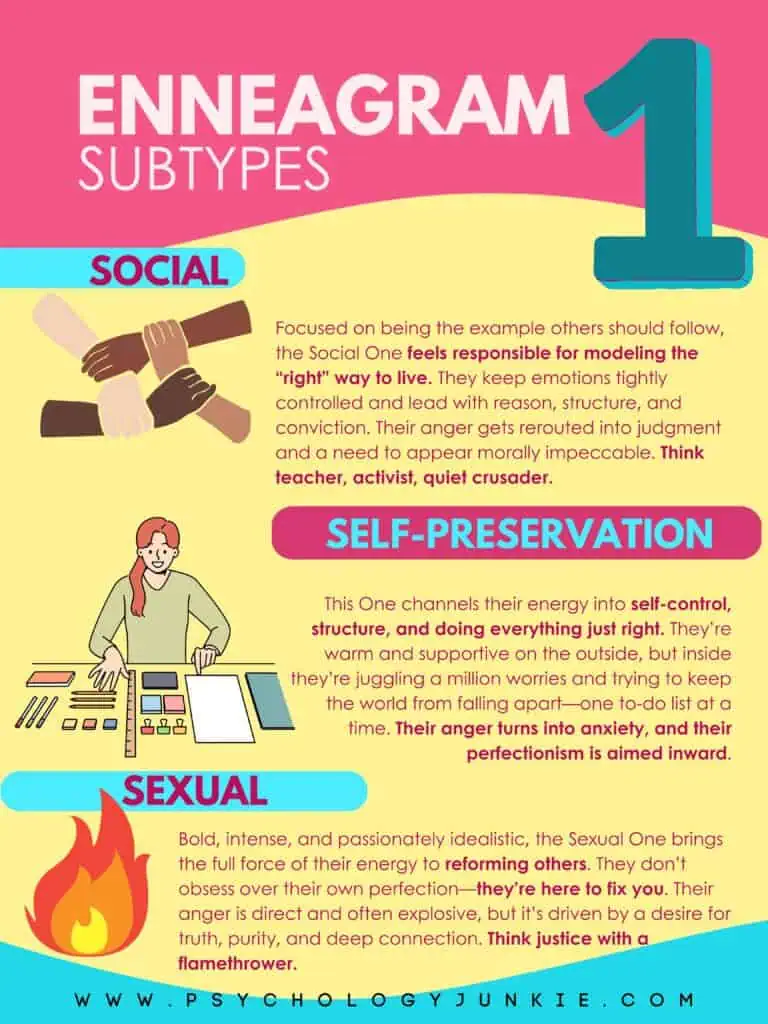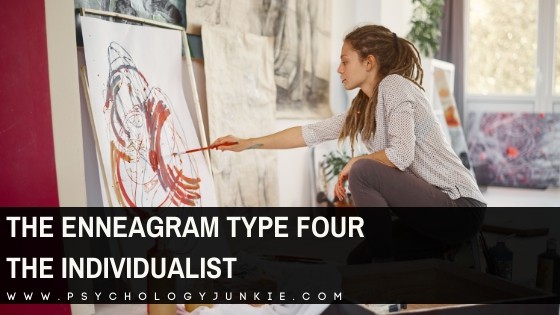The Enneagram 1 Instinctual Variants (Subtypes)
Being a One is like having a hypervigilant ethics committee living rent-free in your brain. They’re constantly whispering things like, “Did you really recycle that correctly?” or “That comma placement was sloppy, and now civilization is unraveling.” It’s not exactly a vacation in here.
But not all Ones express their inner critic the same way. That’s where the instinctual variants come in: Self-Preservation, Social, and Sexual (aka One-to-One, but let’s be honest—”Sexual” sounds more scandalous and therefore more fun to talk about).

Each variant puts the classic One-ish drive for integrity and improvement through a different filter. Same core need to be good, do good, and never, ever make a mistake—but the way that gets expressed? Totally different flavors.
Let’s start with the Social One. Because if there’s a right order to do things, you know they want to go first.
Not sure what your personality type is? Take our Enneagram questionnaire here!

The Social One: Your Friendly Neighborhood Know-It-All (With a Mission)
If you’ve ever met someone who quietly judges your font choice while also donating to six charities before breakfast… you’ve probably met a Social One.
This subtype is what most people picture when they think “classic One.” They are the walking embodiment of “correct.” They follow the rules, then make up better ones just in case the old ones weren’t optimized for maximum goodness. And unlike the Self-Preservation One (who’s trying to perfect themselves) or the Sexual One (who’s trying to perfect you), the Social One is out to fix the entire species.
Their strategy? Lead by example. Be the model citizen. And pray someone is watching, because otherwise how will the world learn how to load a dishwasher correctly?
Underneath the pressed shirt and composed tone, though, is a volcano of frustration that’s been carefully repurposed into control. Think cold rage dressed as calm authority. If anger were a temperature, the Social One’s would be a crisp 60°F. Just chilly enough to make you second-guess yourself.
These folks were often the “good kid” growing up. Quiet. Respectful. Used coasters without being asked. But the cost of that goodness? Emotional repression. A lot of Social Ones learned early that being vulnerable or messy wasn’t safe. So they defaulted to being impressive instead.
They’re the friend who doesn’t yell when you’re late—they just look vaguely disappointed, and now you feel like you kicked a puppy. And if you challenge their views? Buckle up. They might not raise their voice, but they’ll eviscerate your argument with the quiet precision of a surgeon and the conviction of a nun wielding a ruler.
Here’s how Enneagram expert and psychotherapist Beatrice Chestnut puts it:
“Social Ones have a need to represent the perfect model of the way to be or do things through their actions—to teach others by example.”
And yeah. That tracks.
But here’s the real twist: Social Ones don’t actually think they’re better than you. Okay, sometimes they do. But mostly, they just want better—for everyone. And if they seem rigid or emotionally distant, it’s usually because they’re exhausted from carrying the weight of what they believe is their moral responsibility.
They can seem above it all, sure—but they’re also secretly lonely. It’s hard to feel close to people when you’re always trying to model virtue instead of, y’know, just being a slightly flawed human like the rest of us.
At their best? Social Ones are inspiring. Noble. Steady. They show us what’s possible when you actually live your values instead of just tweeting about them.
At their worst? They’re judgmental, controlling, and allergic to being wrong. Like, if you ever hear a Social One say, “I was wrong,” take a picture. Frame it. That moment is a historical artifact.
The growth path?
Learning that there isn’t one single “right” way to do life. That being vulnerable doesn’t make you weak. That sometimes, showing your messy humanness is more powerful than playing the role of “ideal person #437.”
And that parking perfectly between the lines doesn’t make up for cutting someone off emotionally because they had a different opinion on how to fold towels.
7 Signs You Might Be a Social One
- You don’t say you’re better than people—you just quietly demonstrate it.
And then get annoyed when they don’t notice you’re doing things the “right” way. - You correct grammar in your head during conversations.
But you only say something if it’s a teachable moment. Because you’re not rude—you’re helpful. - You’re not angry… you’re just disappointed.
Especially in humanity as a whole. And definitely in your coworker who left dishes in the sink again. - You feel responsible for how other people behave in public.
Because if no one models basic decency, who will? (Also: you’re secretly horrified by people who clap when planes land.) - You say things like, “Well, technically…” and don’t even flinch.
In fact, there’s a small thrill in saying it. Just a little one. Like a single square of dark chocolate justice. - People have called you a “know-it-all” at least once.
You tried not to take it personally. But also… they were wrong. And you can prove it. - You’re trying to make the world a better place—but you wish it didn’t have to be so exhausting.
And deep down, you wonder if anyone sees how hard you’re trying to be good. Not just look good—but be good.
The Self-Preservation One: The Quiet Perfectionist Holding It All Together
If the Social One is out trying to reform the world, the Self-Preservation One is inside making sure the house doesn’t burn down, the bank account stays balanced, and the family eats organic. This is the subtype that looks like a classic perfectionist—organized, anxious, and deeply uncomfortable with chaos. They’re the kind of people who pre-worry just in case you forget to worry later.
Their motto? “If I don’t stay on top of everything, everything might fall apart and it’ll be my fault and also probably the end of civilization, but no pressure.”
Self-Pres Ones learned early that being good meant being responsible. Not flashy-responsible. Not cape-wearing-heroic-responsible. Just quiet, constant, exhausting responsibility. They were probably the kid in the family who followed the rules, kept the peace, and internalized way too much of everyone else’s stress. And now? They’re the adult who still believes the weight of the world sits squarely on their (tense, overworked) shoulders.
On the surface, they’re warm. Supportive. Dependable. The kind of person who always remembers to send thank-you notes and brings extra snacks to the meeting. But underneath that gentle, decent exterior? A volcano of suppressed irritation and impossible standards.
Because here’s the thing: Self-Pres Ones don’t feel angry. Anger is “bad.” Anger is “out of control.” Anger means you’re not trying hard enough to be kind, generous, and above reproach. So instead of exploding, their anger shape-shifts into worry. Or self-criticism. Or endless tinkering to get things just right. You might not see it, but it’s there, humming just below the surface like a microwave that never dings.
As Beatrice Chestnut puts it:
“In this subtype, the anger of the One, together with defenses against that anger, manifest as good intentions, perfectionism, heroic efforts, obedience to rules, and an obsessive striving for perfection.”
Yeah. Nailed it.
Self-Pres Ones often feel like life is a minefield and they’re the only one checking for explosives. They plan for every possibility, anticipate every flaw, and preempt every mistake—because mistakes are dangerous. Mistakes mean you weren’t careful enough. That you weren’t good enough.
And the kicker? They still don’t feel safe.
This subtype tends to carry a deep, often unconscious anxiety. There’s an edge of compulsiveness to how they do things—triple-checking, over-prepping, micromanaging the details that others find “no big deal.” (Spoiler: they are a big deal. The towels should face the same direction. It’s not a crime. It’s called being civilized.)
In relationships, Self-Pres Ones are the rock. The planner. The one who always shows up on time and remembers what kind of tea you like. But they can also be rigid, overly self-sacrificing, and quietly resentful. They have a hard time relaxing—not because they don’t want to, but because relaxation feels irresponsible. Like if they let their guard down, the whole system might collapse. (It won’t. But try telling that to their nervous system.)
Wait, but aren’t Self-Pres Ones basically Sixes with better posture?
It’s a fair question—on the surface, Self-Preservation Ones and Sixes can look weirdly similar. Both can be anxious, rule-following, and a little obsessive about planning. But their motivations come from very different places. Sixes worry because they’re afraid. They doubt themselves, doubt authority, doubt everything, and are constantly scanning for danger. Self-Pres Ones, on the other hand, worry because they’re angry. Angry that no one else is doing things right. Angry that the world feels out of control and they’re the only one trying to keep it together. Sixes are like, “Am I allowed to do this?” Self-Pres Ones are more like, “I’m going to do it correctly, and if no one else is, I’ll just quietly resent you while folding the towels properly.” So yeah—similar behaviors, totally different emotional engines.At their best, they are grounded, reliable, and full of integrity. There’s something sacred in the way they tend to the little things, trying to bring order and decency into a chaotic world. But their growth comes from letting go—just a little. Releasing control. Trusting that they’re not the only competent adult in the room.
Because they don’t have to earn their worth through perfect behavior or relentless vigilance. They’re already good. Even if the counters are messy. Even if dinner is frozen pizza. Even if—deep breath—they make a mistake.
7 Signs You Might Be a Self-Preservation One
- You have a very intense relationship with your to-do list.
It’s not just a list. It’s a lifeline. A sacred document. If you lose it, you spiral. - You don’t explode—you seethe politely.
Your anger comes out as a tight smile, a controlled sigh, or a subtle correction delivered with surgical precision. People say you’re “so calm.” You’re not. - Relaxing feels vaguely immoral.
You try to watch Netflix, but halfway through the show you remember that the fridge needs wiping. And also you should probably prep for retirement. Now. - You’ve pre-packed a travel first aid kit that includes four kinds of allergy meds… and you’re not even allergic to anything.
But what if someone else is? - You’ve said, “If I don’t do it, it won’t get done” more times than you can count.
It’s not martyrdom—it’s just - Your standards for yourself are unreasonably high—and you get mad at yourself for not always meeting them.
Even when you’re sick. Or tired. Or maybe just human. - You’re the kind of person people rely on—and sometimes, you wish someone would just take care of you for a change.
But then you’d probably critique how they did it. With love. And maybe a revised checklist.
The Sexual One: The Reformer with a Flamethrower
If the Self-Preservation One is nervously scrubbing the kitchen counter and the Social One is calmly leading a seminar on Ethical Living 101, the Sexual One is kicking down the door, pointing at your life, and going, “This? This needs work.”
This is the One who doesn’t just want to do what’s right—they want to feel right. Deeply. Urgently. Passionately. And if you happen to be in a relationship with them, congratulations: you are now their passion project.
Where the other Ones turn their laser-focus inward (SP) or outward toward society (SO), the Sexual One zeroes in on you. And you. And occasionally you over there. They see potential in others—usually paired with a strong sense of what needs to be reformed, refined, or completely overhauled.
But don’t call them a perfectionist.
They’re not obsessed with being perfect. They’re obsessed with truth, intensity, and fixing whatever’s broken in you so the relationship (or the world, or your sock drawer) can finally align with their holy inner standard.
This is the countertype of the Ones. The rebel One. The rule-breaking reformer. The “yes, I yelled at you about being disorganized, but also I’m extremely late to therapy and I’m probably going to seduce someone inappropriate later” One.
They have a fiery, almost Eight-like energy—impulsive, intense, idealistic, and, let’s be real, kind of exhausting. They burn hot. They love hard. They confront fast. Their anger doesn’t simmer politely or morph into a tight-lipped smile. No, this is the One whose anger erupts. Usually in the form of passionate rants, dramatic life changes, or impromptu interventions where they try to save you from yourself.
Enneagram excpert and psychotherapist Beatrice Chestnut writes:
“These Ones have an intensity of desire fueled by anger that motivates them to want to improve others. This can be expressed as a sense of excitement, passion, or idealism about the way things could be if people would reform their behavior, or if the reforms they envision were enacted by society. This makes them compelling and vehement.”
They don’t mean to come off intense. They’re just… trying to help. Is it their fault you’re not doing things in the highest, purest, most righteous way possible?
But underneath all that zeal and emotional arson is something kind of beautiful: they actually believe things can be better. They see the potential for growth and greatness, and they want to help you rise to it—because they’ve got a vision for something more meaningful, more aligned, more right.
Of course, this sometimes turns into a full-time job of partner-polishing or society-fixing, all while quietly avoiding the glaring truth: they haven’t turned that same intensity inward. Not really. Because that would mean facing their own pain, their own messiness, their own unmet needs. (Easier to clean your closet than their own.)
In relationships, they bring fire and loyalty, charisma and conviction. They can also bring judgment, control, and a creeping sense that if you don’t meet their standards, you might just get a performance review.
But at their best? Sexual Ones are bold and inspiring. They live with conviction, they stand for something, and they push others to be their best—not just to look good, but to be good. Really good. And when they learn to temper that fire with a little humility and self-awareness, their passion becomes a force of transformation, not destruction.
Because the truth is, the world does need fixing. Just maybe not all at once. And maybe not entirely by you.
7 Signs You Might Be a Sexual One
- You don’t just have strong opinions—you are a strong opinion.
You walk into a room, clock everything that’s wrong, and immediately start mentally rebranding everyone’s life choices. - You’ve tried to “lovingly” fix someone.
Spoiler: they didn’t always experience it as loving. But you did make them better. Kind of. Maybe. You’re welcome? - You often find yourself attracted to people’s potential.
Not necessarily who they are, but who they could - You sometimes confuse intensity for connection.
It’s not love until there’s a little yelling and a shared vision for spiritual renovation. - You have no problem calling people out.
Especially when they’re being lazy, unethical, or slow to evolve. Sometimes you even surprise yourself with how quickly it comes out. - You want deep connection, but sometimes struggle to slow down long enough to nurture it.
Why water the garden when you could set it ablaze and start over? - You live like you’re on a mission.
Even if it’s just a Tuesday. Even if it’s just cleaning the kitchen. There’s always a cause, and you’re always a little bit on fire.
What Do You Think?
Which of these instinctual variants, or subtypes, do you relate to most? Do you have any questions about these subtypes? Let us know in the comments! I’d love to hear from you!
Resources:
The Wisdom of the Enneagram: The Complete Guide to Psychological and Spiritual Growth for the Nine Personality Types by Don Richard Riso and Russ Hudson (Bantam Books, 1999)
The Complete Enneagram: 27 Paths to Greater Self-Knowledge by Beatrice Chestnut (She Writes Press, 2013)








Is it possible to be both Self preservation One and Social One at the same time? Because I found myself identifying with both…
I feel pretty evenly split between Social and Self-Pres. Any given day I may lean a little more one way than another but both resonated very strongly for me.
I’m definitely the self preservation One. However, over time I have been able to notice when to “lighten up” for the sake of those in my family who don’t care what the house looks like, the toilet seat wasn’t raised when he used it last, the peanut wand jelly are still unopened on the counter top and it’s 8pm…. You get the picture. 😉